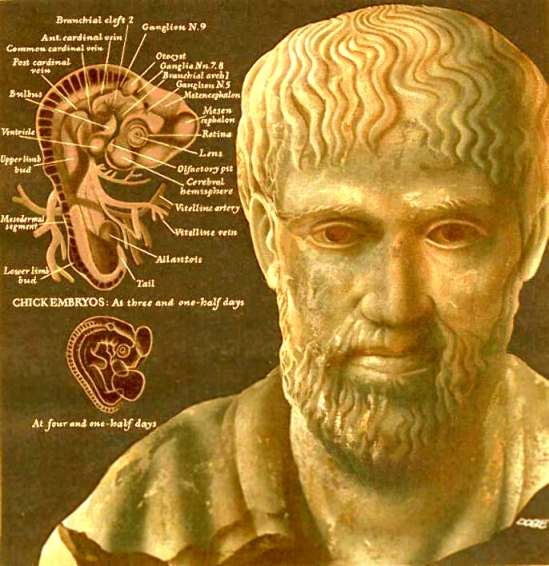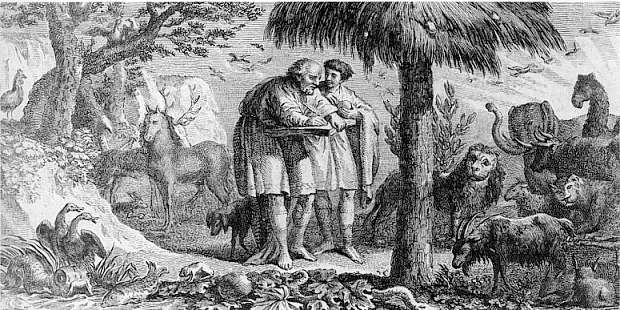
Aristotle (384-322 BC) was more successful in Biology than in Medicine. The expedition of Alexander the Great into Asia helped Aristotle to extend his knowledge not only of the animal tribes, but of their structure. He spent around 800 talents for numerous scientific assistants who helped him in obtaining his knowledge in biology. Some say that he trusted sometimes his assistants and this is one of the reasons of his various errors.
He performed some dissection experiments that was allowed only with animals. For example he opened fertilized chicken eggs at various times and observed so the temporal development of the chicken and his organs. With the limitations he had of the visual inspection only he concluded that the preformation theory is wrong in that the organism is initially fully developed and only just increases in size.
His books on anatomy are lost. Some of his remarkable discoveries:
- bird territories,
- migration of terrestrial animals and fishes,
- hibernation,
- behaviour of social animals. He recognized "the king bee" drones and worker bees (which tend the king), and that the amount of honey available influences the number of drones produced.
- He described vole outbreaks and spoke about cycles of population explosion followed by crashes.
-
Correlation of organs: the fact that certain characteristics are found together (webbed feet with swimming, marsh birds with long legs no good for swimming, therefore no webbed feet, non-flying birds don't have tail-feathers.) This idea was further developed only by Buffon and Cuvier in the 18th-19th century.
-
The concept that organisms are related in a "great chain of being". We may have abandoned the "great chain" idea, but the concept of interrelationship remains. He discusses about 500 species in Historia Animalium. His taxonomy of the animal kingdom looks surprisingly "modern" in outline. EG: Apes are intermediate between human beings and other quadrupeds. (Moore p.35). EG: he classifies snakes with the "quadrupeds", even though they have no legs, because he felt (rightly so) that they were in other respects so similar to lizards. He obviously had a sense of natural affinities.
-
Recognizes the distinction between analogous and homologous structures: one of the most important principles of general morphology. (quotations from Moore, p. 34) "For what the feather is to a bird, the scale is to a fish." or from Incessu Animalium: "Birds in a way resemble fishes. For birds have their wings in the upper part of their bodies and fishes have two fins in the front part of their bodies. Birds have feet on their underpart and most fishes have a second pair of fins in their under-part and near their front fins."

Aristotle studying animals (1791)
All living creatures, whether they swim, or walk, or fly, and whether they come into the world with the form of an animal or of an egg, are engendered in the same way. Concept of epigenesis and that in the embryo, more generalized structures appear before the more specialized ones. Our modern understanding of embryology has a tortuous history. Over the ages we have intellectual battles between those favouring epigenesis and those favouring preformation. Epigenesis was one correct idea of Aristotle that was often discarded.
• children sometimes resemble distant relatives more than their parents. This couldn't occur if the genetic particles were obtained by direct transmission.
• children of mutilated/crippled parents do not display these mutilations (an idea essentially "forgotten" until re-stated by Weismann 2100 years later!)
• both male AND female contribute to the characteristics of the offspring. Amazing though it may seem, this was ultimately ignored, and well into the 18th ? Century it was believed that only the male provided the characteristics of the offspring, the female serving merely as an "incubator".
-
About 340 B.C. Aristotle observed that dolphins gave birth to live young that were attached to their mothers by umbilical cords. For this reason, he considered dolphins and related creatures to be mammals. In his biological writings he presented a classification system of animals that was not fully replaced until the time of Linnaeus.
James Yolkowski
-
Today we have the problem of a population growth and the Chinese government requires couples to have only a small number of children. Aristotle's opinion (Politics): As for the exposure and rearing of children, let there be a law that no deformed child shall live. But as to an excess in the number of children, if the established customs of the state forbid the exposure of any children who are born, let a limit be set to the number of children a couple may have; and if couples have children in excess, let abortion be procured before sense and life have begun; what may or may not be lawfully done in these cases depends on the question of life and sensation.
)
Aristotle Works

